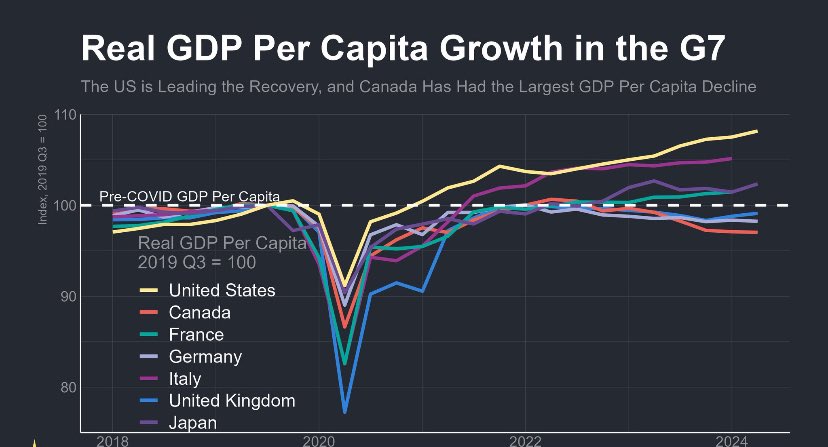Liberal and Conservative pundits have compared the Biden-Harris economic record to the economic record of the Trudeau government but for very different reasons.
Liberal pundits are doing this because they are desperate to reframe Justin Trudeau’s time in office. If they can link him to Kamala Harris – who is quite popular in Canada – they believe they can link him to a narrative of ‘progressive renewal’ and momentum.
Conservative pundits are doing this because many are locked into the U.S. media ecosystem and assume that the Conservative Party of Canada is the same as the Republican Party in the United States, while also assuming the Democratic Party is the same as the Liberal Party.
Both sides are incorrect.
For the Liberals, their main problem from an image perspective is that Justin Trudeau isn’t offering anything different. Joe Biden & Kamala Harris have been in power for less than four years. Kamala Harris only became her party’s standard-bearer just over a month ago.
Meanwhile, Justin Trudeau has been in office for nearly a decade. He has been the leader of his party that entire time. He is still leading his party. Further, while Harris is a generation younger than both Biden & Trump, Trudeau is seven years older than Pierre Poilievre. If Canadians are looking for youthful leadership, Trudeau won’t be the choice.
For right-leaning pundits, the comparison between the Conservatives and Republicans breaks down in multiple areas. First, the Conservative Party’s stated position on same-sex marriage and abortion is nearly identical to that of the Democratic Party. Any Conservative politician at a high level in Canada who called for severe abortion restrictions would face not only a significant internal revolt but also electoral oblivion. Additionally, while significant segments of the U.S. Republican Party have embraced a conspiratorial anti-Ukraine, pro-Russia, anti-US institution worldview, the same has not happened in the Conservative Party of Canada.
As for a comparison between the Democratic Party and the Liberal Party, Justin Trudeau is far to the left of the average Democratic voter and average Democratic politician. When it comes to issues like military spending, law and order, immigration, and freedom of speech, Trudeau is far more interventionist than most Democrats are. A more apt comparison would be to say that Trudeau would fit in the far-left segment of the Democratic Party, rather than fitting with the party as a whole.
It is also important to remember that the Democratic Party is far more popular than the Republican Party in Canada. Even Conservative supporters split about 50/50 when asked which American Party they would vote for. Democratic Governors like Josh Shapiro, now VP candidate Tim Walz, Roy Cooper, and others would likely be Conservatives if they lived in Canada.
And most importantly, the comparison breaks down because the two government’s economic records couldn’t be any different.
If we start from 2020-2021, both Canada and the U.S. were in a similar situation. Both countries had locked down, doing immense damage to the economy (and before seeing this as partisan, remember that Trump locked down the U.S. just as Trudeau locked-down Canada). Both countries ran massive budget deficits.
But since then, the divergence has been shocking.
Canada can only dream of having a strong economic recovery like that in the United States.
The average American is getting richer, while the average Canadian is getting poorer.
The U.S. economy is growing in a way that makes people better off, while Canada’s ‘growth’ is due entirely to unsustainable population increases.
Those are simply the facts.
While some on the right may want to dismiss these facts to try and attack the Democrats, and some on the left want to dismiss these facts to falsely prop up Justin Trudeau’s image, the reality is that the Democratic Party of the United States has a strong economic record to campaign on, while Justin Trudeau’s economic record is an absolute disaster.
Spencer Fernando
https://spencerfernando.com/2024/08/31/the-u-s-economy-is-strong-the-canadian-economy-is-not/


